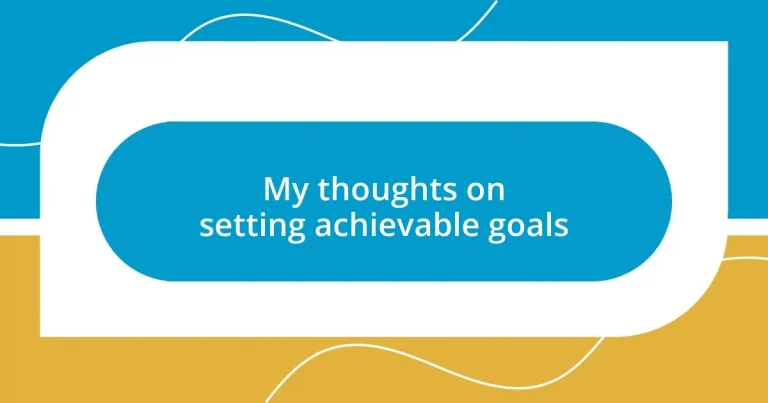Key takeaways:
- Achievable goals should be realistic, specific, and broken down into manageable steps to maintain motivation.
- Setting goals provides direction, boosts confidence through small achievements, and promotes accountability through progress tracking.
- Common pitfalls in goal setting include setting overly ambitious targets, neglecting regular reflections, and fearing failure; overcoming these can lead to sustainable progress.
- Measuring progress involves both quantifiable metrics and qualitative reflections to truly understand the emotional journey and adjust goals as needed.
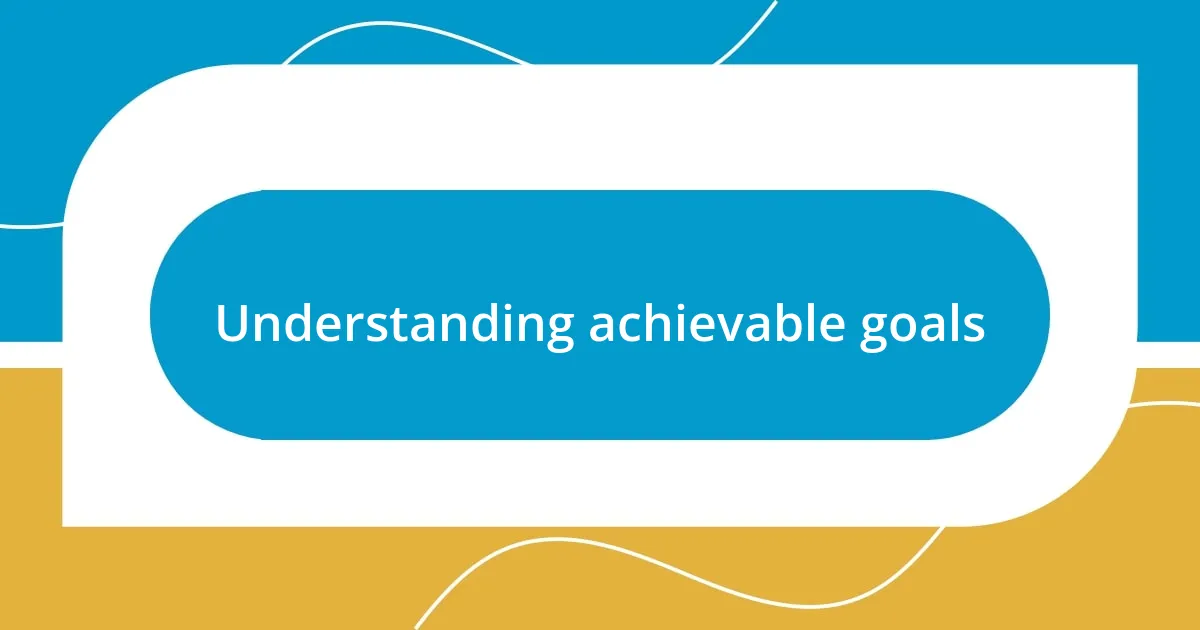
Understanding achievable goals
When I think about achievable goals, I remember the time I decided to run my first half-marathon. I didn’t start by envisioning myself crossing the finish line; instead, I broke it down into smaller, manageable steps—like running a mile without stopping. It made the journey feel less daunting and much more exciting.
Achievable goals are all about setting realistic expectations based on where you are right now. Have you ever pursued something that felt out of reach? I have, and those experiences taught me that it’s important to consider your current situation and resources. When I aimed for a promotion at work, I made sure to gather the skills I needed before diving in. It was a game changer.
Understanding achievable goals also involves recognizing your motivation and why those goals matter to you. For instance, when I wanted to improve my health, it wasn’t just about losing weight—it was about feeling more energetic and confident. What drives you towards your goals? Unpacking that can pave the way for setting targets that truly resonate with your life’s bigger picture.
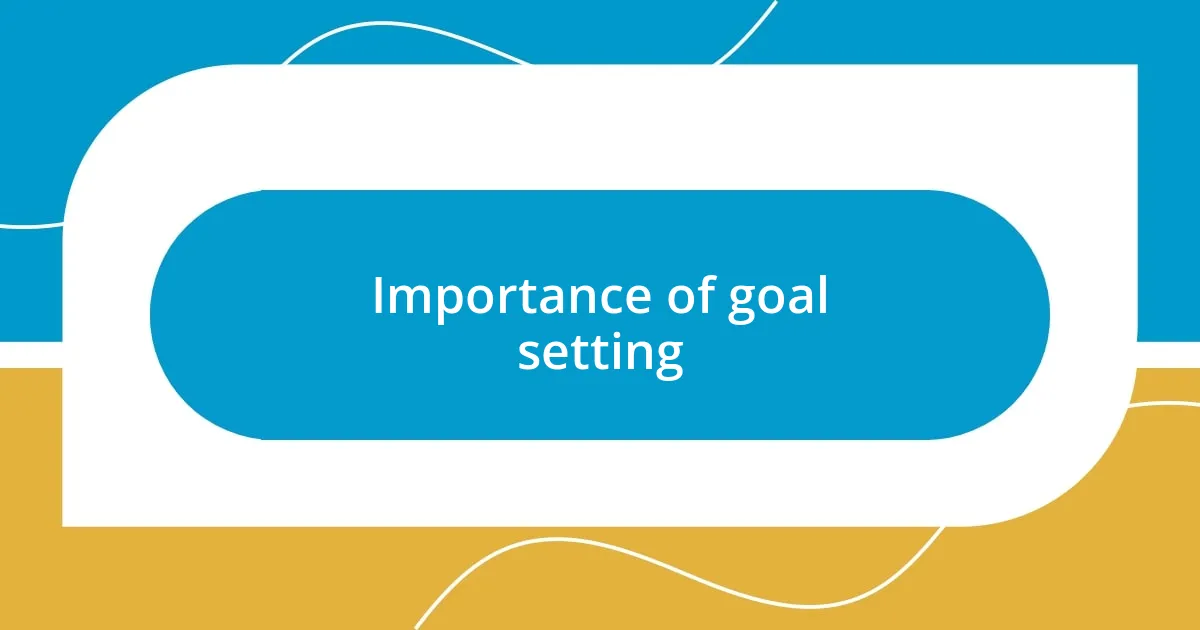
Importance of goal setting
Setting achievable goals is fundamental because they provide direction and clarity. I remember when I first aimed to learn a new instrument; the vast expanse of music theory felt overwhelming. By breaking it down into manageable lessons, I could see my progress, which fueled my motivation to continue.
Another crucial aspect is the boost in confidence that comes from meeting your goals. I once set a goal to read a book a month. Initially, it seemed ambitious, but as I reached each small target, I felt a sense of accomplishment that motivated me to set even higher aspirations. This sense of achievement not only kept me engaged but also helped me tackle other challenges in my life.
Moreover, goal setting keeps you accountable. When I decided to save for a vacation, I tracked my savings monthly. It not only held me accountable but also made the goal feel tangible. This approach turned my dream into a concrete plan, reinforcing the importance of setting realistic objectives for successful outcomes.
| Aspect | Importance |
|---|---|
| Direction & Clarity | Helps define where you want to go. |
| Boosts Confidence | Achieving smaller goals builds momentum. |
| Accountability | Tracks progress and makes goals tangible. |

Characteristics of effective goals
Setting effective goals means crafting them in a way that fuels motivation and fosters success. From my experience, I’ve discovered that effective goals share some key characteristics. For instance, I once aimed to develop a daily meditation practice—it was crucial that my goal was specific. Instead of saying, “I want to meditate more,” I committed to “meditating for 10 minutes every morning.” This clear target not only provided focus but also gave me a sense of accomplishment each day.
Here are some characteristics I’ve found to be essential for effective goals:
- Specificity: Instead of vague intentions, goals should be clear and well-defined.
- Measurable: It’s vital to track progress—like counting the days you stick to your goal.
- Achievable: Goals should stretch you but remain realistic; when I aimed to read four books a month, I quickly realized two was more manageable.
- Relevant: The goal should align with your broader life objectives, making it personally meaningful.
- Time-bound: Establishing a timeframe creates urgency; for example, aiming to learn a new skill over three months makes it feel more tangible.
In my case, each new book I completed not only offered knowledge but reinforced my desire for continuous learning. By deliberately crafting my goals with these qualities, I’ve seen firsthand how they pave the way for success.
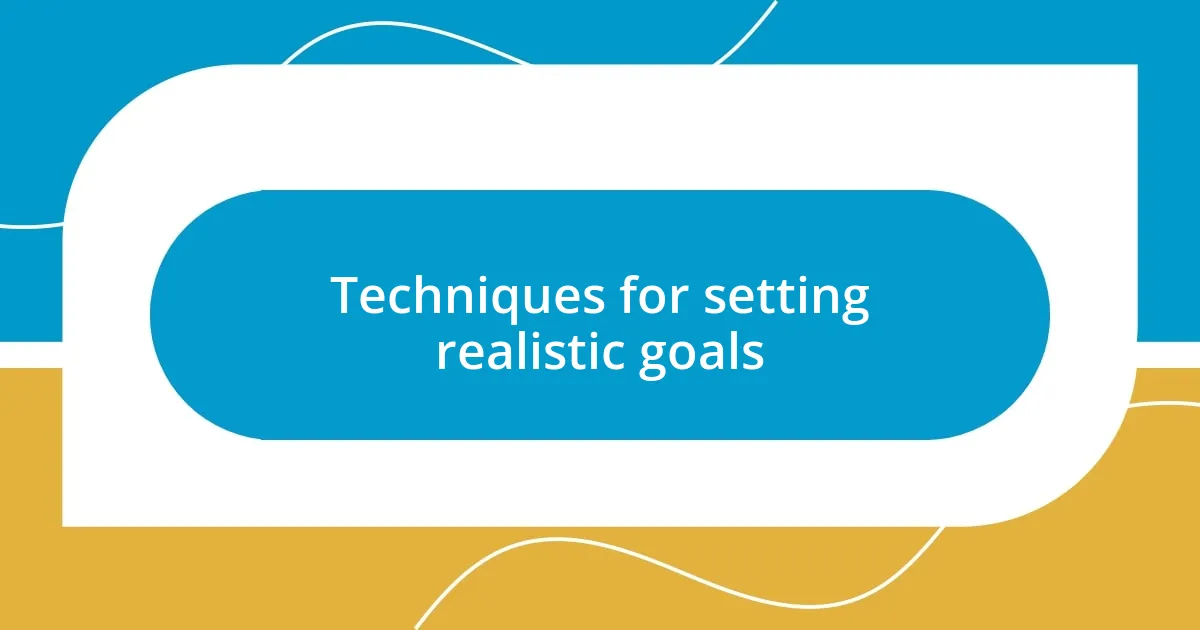
Techniques for setting realistic goals
One effective technique for setting realistic goals is the SMART criteria, which stands for Specific, Measurable, Achievable, Relevant, and Time-bound. I recall when I wanted to improve my fitness level; instead of vaguely stating, “I want to get fit,” I specified, “I will run three miles every Saturday for the next month.” This specificity transformed my goal from a vague desire into an actionable plan.
Another approach I’ve found helpful is to visualize the end goal while breaking it down into smaller, manageable steps. I once had a goal to write a book, which felt daunting at first. By dividing it into sections and committing to write just 500 words a day, I could see my progress building over time. It’s fascinating how visualizing success makes the entire process feel more achievable, don’t you think?
Lastly, I always prioritize reflection when working towards my goals. After completing a task or reaching a milestone, I take a moment to reflect on what worked and what didn’t. For instance, during my journey to learn a new language, I often evaluated my methods. This reflection helped me adjust my approach, making the journey not just productive, but also insightful. Isn’t it incredible how this practice fosters growth and keeps us on track?

Steps to achieving your goals
One of the first steps I always take when pursuing a goal is to write it down. There’s something powerful about transforming a thought into words. For example, when I wanted to learn photography, I scribbled down my intent and broke it into monthly milestones, like attending a workshop or practicing composition weekly. Writing it down not only made it real but also served as a constant reminder of my commitment—have you ever felt that shift when you clearly define something?
Once I have my goal documented, I prioritize creating a structured action plan. I remember when I decided to enhance my public speaking skills. Instead of diving headfirst into giving presentations, I mapped out smaller tasks: joining a local Toastmasters group, practicing in front of friends, and even recording myself to observe my delivery. Each small step kept me motivated, as I could see my progress in tackling what once felt like an overwhelming challenge. How do you approach breaking down your goals?
Lastly, I never underestimate the importance of accountability. Sharing my goals with friends or joining a support group has often kept me on track. When I committed to running a half marathon, telling my friends about it created a sense of communal motivation. We even set up weekly check-ins to share our progress, making the journey not just about individual achievement but a collective adventure. Isn’t it amazing how a simple conversation can elevate our dedication and transform our experience from a solo endeavor into something far more enriching?

Common pitfalls in goal setting
One of the most common pitfalls I’ve encountered in goal setting is the tendency to set overly ambitious targets. I remember trying to learn a new musical instrument, and I aimed to master an entire song in a week. It wasn’t long before I felt defeated, realizing that my expectation was unrealistic. Have you ever set a goal that felt overwhelming and then lost your motivation? It’s crucial to pace ourselves; small, incremental steps often lead to sustainable progress.
Another trap is neglecting to check in on your goals regularly. I once set out to read a certain number of books in a year but didn’t track my progress. By mid-year, I discovered I had only read a couple, and it felt disheartening. How often do we overlook this vital step? Regular reflection not only helps us stay accountable but also allows us to celebrate small victories along the way, which keeps the enthusiasm alive.
Lastly, fear of failure can be a significant stumbling block. I recall hesitating to share my writing with others for critique because I was afraid of judgment. That fear held me back until I realized that for growth, discomfort is often a necessary ingredient. How often do we let fear overshadow our potential? Embracing vulnerability can open up new avenues for feedback and improvement, transforming our mistakes into powerful learning experiences.
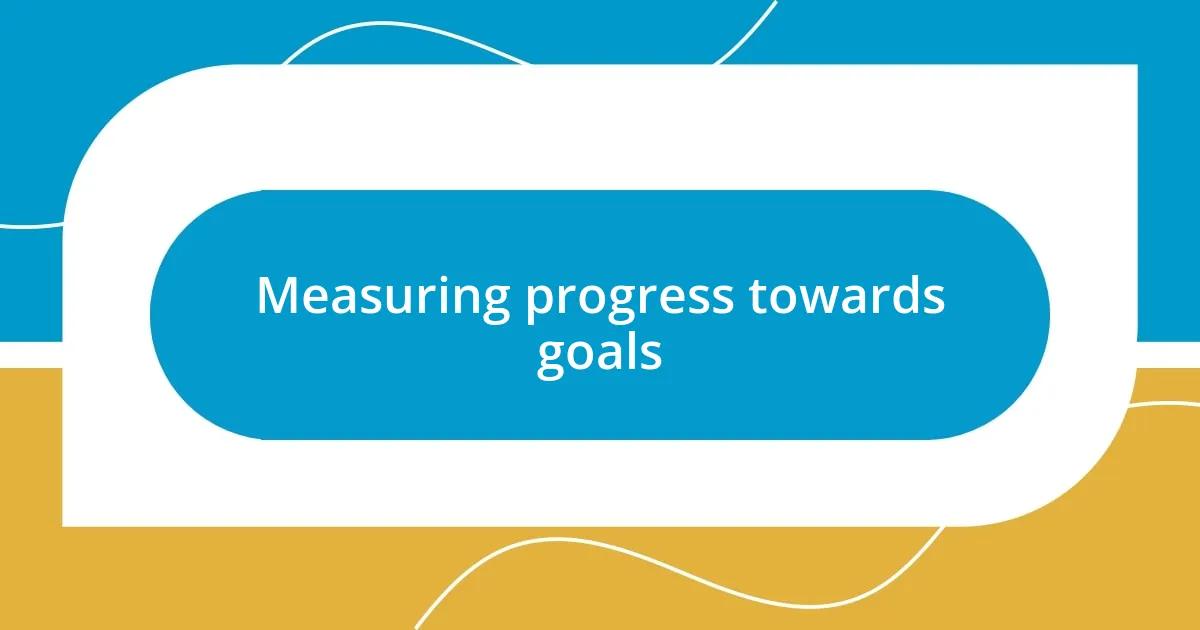
Measuring progress towards goals
Measuring progress towards goals is essential, and I often rely on both quantifiable metrics and qualitative reflections. For instance, when I was developing a fitness routine, I tracked my workouts using an app. Each completed session felt like a mini victory, motivating me to keep going. Have you ever looked back at your progress and felt that rush of accomplishment?
Beyond numbers, I also find it valuable to pause and reflect on how I feel about my journey. A few months into my fitness plan, I noticed a change not just in my physical strength but in my mental resilience. I began to appreciate the effort I put in beyond the numbers, fostering a deeper connection to my goals. How often do we consider the emotional aspect of our progress?
In addition, I’ve learned that adjusting my goals as I progress is sometimes necessary. I once aimed for a specific weight loss target, but as I became more attuned to my body, my focus shifted to overall well-being. This flexibility allowed me to embrace the journey rather than just the destination. Have you ever had to pivot your goal and found a better path by doing so? Recognizing that progress is not always linear can be liberating, opening up new possibilities along the way.












